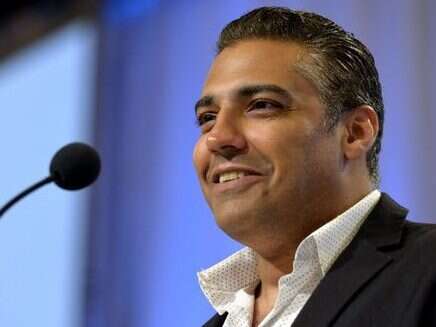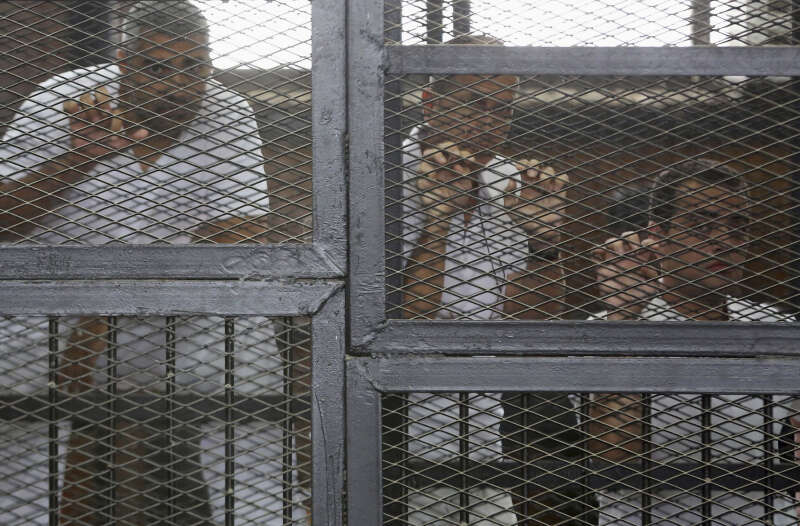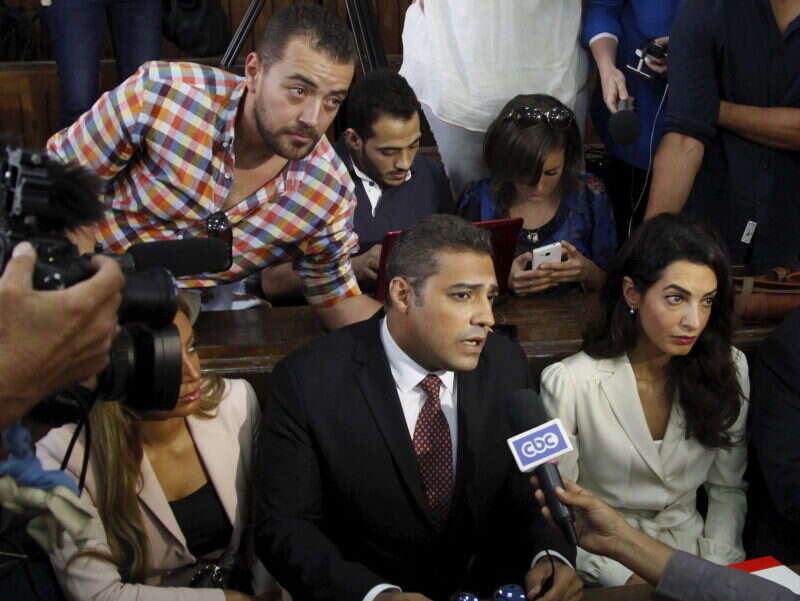
One of the three Al Jazeera journalists who were imprisoned in Egypt for airing “false news” has warned press freedom has deteriorated worldwide since he was released almost four years ago.
Canadian Mohamed Fahmy blamed US President Donald Trump for some of the “amplified threats” against journalists, saying his “irresponsible rhetoric… actually could lead to more journalists being jailed” in the Middle East.
Fahmy spoke to Press Gazette ahead of the Foreign Office’s inaugural international media freedom conference being held in London next week, at which he will speak alongside his former lawyer and UK special envoy on media freedom Amal Clooney.
He was one of three journalists for Al Jazeera English who spent more than 400 days in prison in Egypt after being arrested in December 2013.
Bureau chief Fahmy, Egyptian national Baher Mohammed and Australian Peter Greste were convicted in June 2014 of being part of Morsi’s Muslim Brotherhood, which authorities had declared a terrorist organisation, and of airing falsified footage intended to damage national security.
Their convictions were overturned on appeal after it was ruled their rights had been violated, but Fahmy and Mohammed were again convicted and jailed in August 2015 before being pardoned and released about three weeks later. Greste had by this time been deported back to Australia.
Speaking to Press Gazette, Fahmy said his arrest shook his ideals as he had never thought his work would mean he would be branded a terrorist.

Al Jazeera journalists Mohammed Fahmy, Peter Greste and Baher Mohamed stand behind bars at a court in Cairo in May 2014. Picture: Reuters/Stringer
Despite his imprisonment he has “no regrets” about the work he did – only the decision to work with Al Jazeera, who he is now suing for allegedly knowingly endangering his life.
“Your life suddenly takes a very different turn and you become the story when you should never be the story,” Fahmy said.
“My time in prison reminded me of the importance of the work NGOs do in civil society and how they become a lifeline to people in situations like that, for innocent people behind bars, and that’s what inspired me to get involved in advocacy and activism.
“It’s sort of a passport you have when you get out – I think a lot of people who have been imprisoned come out feeling they have a responsibility and a platform.”
Since leaving prison, Fahmy has become a vocal campaigner for press freedom, often giving lectures in the US and Canada about “the importance of press freedom and the importance of writing what you want and not self-censoring”.
“The most important message I put out there is no story is worth dying for but what we do is something that’s vital to society,” he added.
Fahmy’s campaigning work over the past four years led to him joining The Investigative Journal as its chief executive this spring.
The London-based investigative news website launched in February in an effort to “counteract fake news and produce revelatory public interest investigations”, including on the subject of press freedom.
Fahmy, working alongside his press freedom advocacy organisation Fahmy Foundation and Amnesty International, has also proposed a Protection Charter to the Canadian Government which would increase support for citizens detained or under threat overseas.
The idea came, he said, “when I was sitting on the floor of a dingy cell thinking about what the Government should be doing”.
Although the United Nations is facing calls from more than 60 international media groups to support a convention on the safety of journalists, Fahmy said the organisation is “overloaded” and needs a specific envoy to deal with the issue who is unaffected “by arms deals and what happens between governments”.
He added that the UN should amplify concerns over press freedom, including by fully investigating the killing of Washington Post columnist Jamal Khashoggi in the Saudi consulate in Istanbul last year, “because the threats have been amplified”.
“Right now journalists are not just targeted by Governments, they are targeted by extremists on the ground…
“Unfortunately the leader of the free world Mr Trump has emboldened autocratic leaders in the Middle East to continue to target journalists by his irresponsible rhetoric.
“When I watch the Arab news, I’m seeing almost on a daily basis state-sponsored anchors endorse Mr Trump and saying the same stuff he’s saying – CNN journalists are this or that, they’re giving fake news.
“It’s just horrible. It’s irresponsible. It actually could lead to more journalists being in jail. That’s what’s happening on the ground in reality.”
Speaking about the UK’s current record on press freedom, Fahmy said next week’s conference was a “positive, huge step” and praised Foreign Secretary Jeremy Hunt’s appointment of Clooney as a special envoy on media freedom as an “excellent decision”.

Mohamed Fahmy (centre) and Baher Mohamed (left) talk to the media with lawyer Amal Clooney (second right) in court in August 2015. Picture: Reuters/Asmaa Waguih
But he also noted the UK is ranked 33rd out of 180 countries on the World Press Freedom Index for 2019 compiled by Reporters without Borders because of issues relating to security, whistleblowing and data protection.
Looking ahead to the conference next week, Fahmy said: “The UK doesn’t throw journalists in jail but this whole congregation of journalists on the frontline and journalists who are involved in press freedom advocacy is a huge, good step.”
It is thought that about 350 journalists were imprisoned in 2018, an increase of nearly seven per cent on the previous year. More than half of them were being held in just five countries: China, Iran, Saudi Arabia, Egypt, and Turkey.
Between 80 and 94 journalists are thought to have been killed in 2018, depending on how the term is defined.
“I think that the situation has got worse worldwide since I was in prison.
“I remember in 2014 when I was in court on World Press Freedom Day I was shocked hearing that there were 200 journalists behind bars. Now we are talking globally that this number has almost doubled.”
He added: “Press freedom is something the world needs now more than ever.
“As journalists we should continue at every chance we get to highlight the importance of protecting journalists because it needs to be very clear that people need to be accountable.
“UN security member states should understand that they can’t get away with it.”
Picture: The Investigative Journal
Email pged@pressgazette.co.uk to point out mistakes, provide story tips or send in a letter for publication on our "Letters Page" blog
